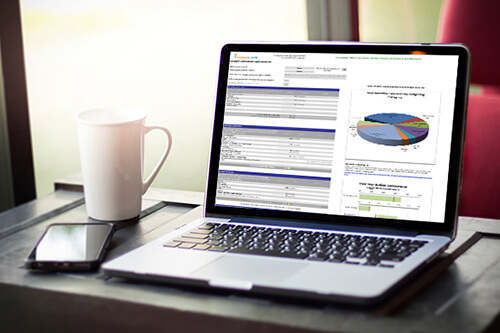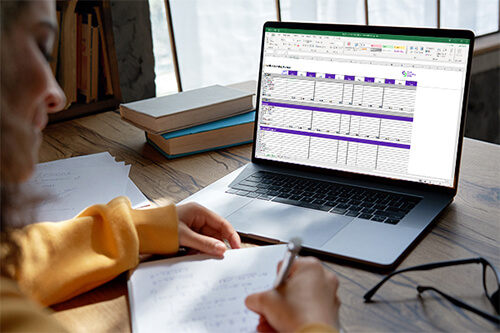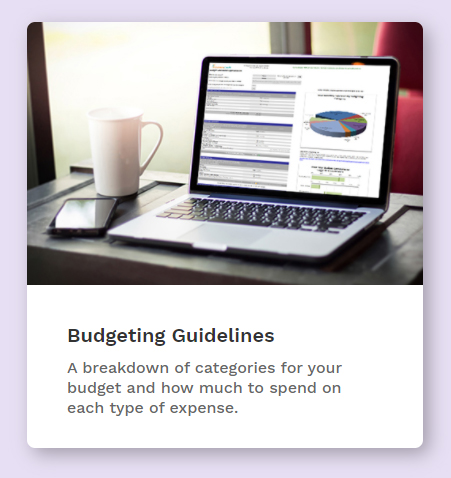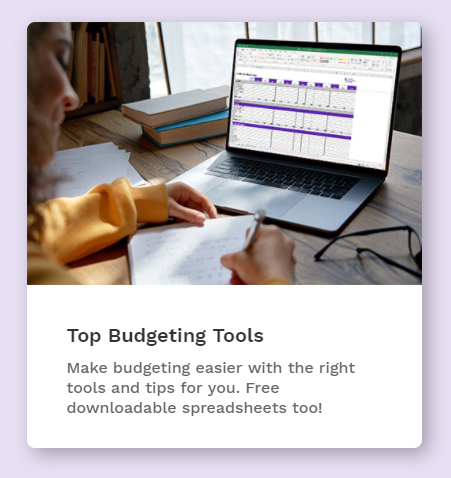Why Summer is the Perfect Time for a Financial Check In
Tips to plan ahead in the summer to help avoid the January holiday debt hangover
By Carmen Chan
During summertime, holiday debts, spending, bills, and stress seem a million miles away. Believe it or not, that’s what makes this a great time to check in with your finances. Whether it’s a quiet afternoon while the kids are at camp or a few days off work for a staycation, taking advantage of the slower days of summer to check in with your finances is a great way to avoid a future holiday debt hangover. Here are some tips to get you started.
Set Yourself Up for Success During Your Financial Check In
For many of us, going over our finances can be a stressful experience, so set yourself up for success by mitigating the stress ahead of time. Gather everything you’ll need for your financial check in before you get started. Start with documents like:
- your budget (if you have one)
- credit card statements
- bank statements
- household bills
And make sure you’re stocked up on anything else you might need during your financial check in:
- pens
- paper
- laptop/phone/tablet
- charger(s)
- notebook
- calculator
This will look different depending on whether you use paper copies of your documents or track things digitally, but either way make sure you have everything you need before you get started. This will help you avoid the distraction and frustration of getting interrupted because of missing documents or items.
Schedule Your Financial Check In to Minimize Stress and Anxiety
Everybody’s schedule is different, so check your own to see what time of the day and week is best suited for you to do your financial check in. If you’re an early riser and enjoy the morning quiet, you may want to do this earlier in the day when you feel the most alert and calm.
On the other hand, if you’re more of a night owl, set aside some time later in the evening when you’re feeling less pressured with other daily tasks. Try to avoid doing your financial check in during particularly busy or hectic times of the day or week. You’ll be more likely to get frustrated, make mistakes, or give up on the task entirely. Once you’re all set up, it’s time to look at the numbers.
ADHD Money Management: 5 Ways to Work With Your Brain, Not Against It
1. Start by Calculating How Much You Owe
The first step — assessing the damage and getting the full picture of how much debt you’re in — can be the hardest step, especially if you’re struggling with debt. It can be tempting to bury your head in the sand, but now that you’ve got the numbers in front of you, it’s time to face reality. Look over your bank and credit card statements and comb through the charges line by line. This is a good way to ensure you recognize each purchase in case of credit card fraud.
Tally up how much you spent in total, how much debt you’re now carrying on each card, when each payment is due, and what each interest rate is.
2. Adjust or Create a New Budget, Accounting for Debt Repayment
Doing a summertime financial health assessment offers you a chance to finish the year off strong and to start the new year with a plan in place. Don’t shy away from facing your debt head-on and take responsibility by creating a budget that will help you decrease your debts and avoid holiday debts later in the year.
Write out a list of your fixed expenses, including your mortgage or rent payments, your bills, transportation, and grocery costs, and then figure out how much is left over for your debt and discretionary spending.
For example, if you have $500 left over after paying for housing and meals to feed your family, direct the remainder of your income to make payments towards your debts. If you can, automate your bill payments so they line up with your pay days and you aren’t incurring late or missed payments, or fees for non-sufficient-funds (NSF)– which can cost you as much as $45 or $50 per transaction.
If you’re new to building a budget or you feel like you need some extra help, we have a webinar for that! Don’t miss Making Cent$ of Money — Budgeting 101
3. Set Your Financial Goals for Next Year (and get ahead of the dreaded holiday debt hangover)
Often, goal setting and financial check ins are left until January. But why not start planning your goals or resolution in the summertime? Whether you want to pay off your debts, start saving for retirement, start an education fund, or save for any other financial goal, planning ahead is always going to benefit you.
Going over your income and your budget, decide on when you can feasibly pay off your outstanding debts and start saving towards your holiday expenses. Keep in mind, if you schedule in a few no-spend weeks or weekends, it will add a significant boost to your budget. Believe it or not, it can also be a fun challenge!
Chart the course for your month-to-month debt repayments, throwing as much of your income as you can afford towards paying off what you owe. There are even strategies that can help you decide what the best way to pay off debt is.
Is Your Summer Budget Actually Just Delayed Debt?
Scale Back Small Spending for Big Savings
Be diligent about cutting the ‘small spends’ in your budget to see some big savings. A good place to start is unsubscribing from newsletters and notifications from your favourite stores, sharing their upcoming bargains and must-have products.
You can scale back further on your discretionary spending, by making lunch and coffee at home and skipping the drive throughs whenever you can. Track how much money you’re saving or transfer the amount over to a savings account each day or week. It will give you a better sense of how much money you’re saving, and it will incentivize you to keep going!
Look for Options to Decrease Your Debts or Pay Them Off Faster
Another constructive step you can take during your summertime financial check in is looking at options that will allow you to pay off your debts faster. One of these is to transfer your credit card debts to a new credit card with a zero-interest grace period for the first three months. If you decide to take this route, make sure you do your research and read the fine print before taking the plunge. Without a lot of discipline, this could end up doubling your debt. And be sure to either cancel those existing cards or keep them out of sight to avoid the temptation of wracking them up again!
How to Stay Motivated When Paying Off Debt
Plan Ahead for Your Holiday Budget… This Summer
If you’re determined not to land deep in debt again this upcoming Christmas, start planning your holiday budget now. Begin with a post-mortem on last year’s holiday spending – did you splurge on presents, host too many parties at home, or go on an unnecessary Boxing Day shopping spree?
Scrutinize your spending – this introspection will help you avoid the spending traps you fell into the previous holiday season. You’ll also have the time and space to decide on where it’s worth splurging – such as the turkey and trimmings – and where you can cut back on your spending – such as the wrapping paper and stocking stuffers.
As an added bonus, shopping outside of the official “holiday season” means you’re less likely to overspend due to stress and time constraints. Holiday items are often significantly cheaper when they’re out of season. Doing your budgeting and shopping well ahead of time is a great way to stick to your list and avoid any unnecessary spending.
So with a calculated budget in mind, you are ready to start saving for this year’s holiday spending. You can put away a little at a time and have a decent amount saved up by the end of the year.
Taking the time to do a summertime financial check in, can help you find the red flags in your year-round spending. Are you spending more than you earn, paying way too much interest on your credit card debts, or getting further in the red month-over-month? If any of these are the case, you’ll need to look at your spending habits and scale back in a big way.
Look for Options to Decrease Your Debts or Pay Them Off Faster
Another constructive step you can take during your summertime financial check in is looking at options that will allow you to pay off your debts faster. One of these is to transfer your credit card debts to a new credit card with a zero-interest grace period for the first three months. If you decide to take this route, make sure you do your research and read the fine print before taking the plunge. Without a lot of discipline, this could end up doubling your debt. And be sure to either cancel those existing cards or keep them out of sight to avoid the temptation of wracking them up again!
How to Stay Motivated When Paying Off Debt
Are You Stressed About Your Finances and Need a Check In or Assessment? We Can Help You Avoid a Debt Hangover Any Time of the Year!
If you’re feeling overwhelmed, anxious, or stressed about how to get a handle on your summertime financial check in, you can always reach out to us for a free, confidential assessment of your finances. We’ve got friendly, accredited financial counsellors who can provide clarity around budgets, savings, debt repayment, and more.







